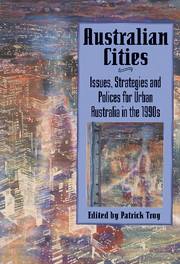Book contents
- Frontmatter
- Contents
- List of Figures
- List of Tables
- Preface
- Acknowledgements
- Note on Contributors
- Abbreviations
- Introduction
- Part I The Development and State of Australian Cities
- 1 Sustaining Suburbia: An Historical Perspective on Australia's Growth
- 2 The Urban Debate: From ‘Los Angeles’ to the Urban Village
- 3 National Urban Policy in the 1990s
- 4 Households, Consumerism, and Metropolitan Development
- Part II Current Policies and Options
- Part III Avenues for Development
- References
- Index
3 - National Urban Policy in the 1990s
Published online by Cambridge University Press: 03 May 2011
- Frontmatter
- Contents
- List of Figures
- List of Tables
- Preface
- Acknowledgements
- Note on Contributors
- Abbreviations
- Introduction
- Part I The Development and State of Australian Cities
- 1 Sustaining Suburbia: An Historical Perspective on Australia's Growth
- 2 The Urban Debate: From ‘Los Angeles’ to the Urban Village
- 3 National Urban Policy in the 1990s
- 4 Households, Consumerism, and Metropolitan Development
- Part II Current Policies and Options
- Part III Avenues for Development
- References
- Index
Summary
Since 1990 cities have returned to the national policy agenda after a long absence. Not since the heady days of Whitlam and the Department of Urban and Regional Development (DURD) has a national government seen it necessary to develop explicit policies and programs for the cities. This chapter analyses the national ideas and policies of the 1990s and some of the debates about them against the background of the recent history of national involvement in urban policy and the broader direction of public policy in contemporary Australia. In particular, the relation of the general debates about economic rationalism to the contemporary developments in national urban policy are explored.
National Urban Policy: 1968–1989
The story of national urban and regional policy from the late 1960s to the late 1980s can be divided into three main phases: a ‘social democratic’ phase under Whitlam; what can be loosely called a ‘libertarian’ phase under Fraser, and a ‘corporatist’ phase under Hawke.
The Whitlam urban program was conceived in an era when there was general confidence in the capacity of government to undertake reform. There was broad agreement about what was wrong with our cities and what needed to be done. While many bemoaned the ‘great Australian ugliness’ of the suburbs, no one seriously challenged the Australian preference for house and garden and the fringe urban growth that resulted.
- Type
- Chapter
- Information
- Australian CitiesIssues, Strategies and Policies for Urban Australia in the 1990s, pp. 65 - 86Publisher: Cambridge University PressPrint publication year: 1995
- 6
- Cited by



